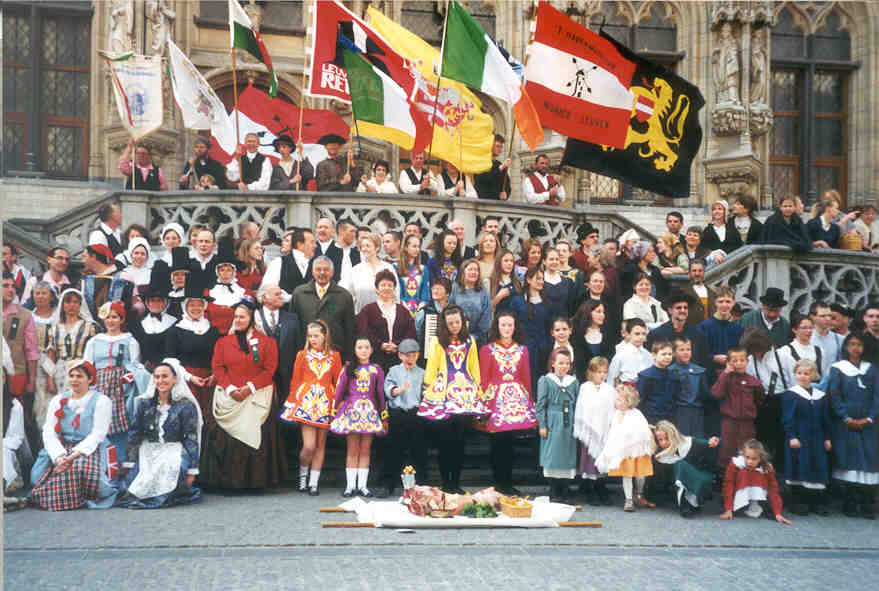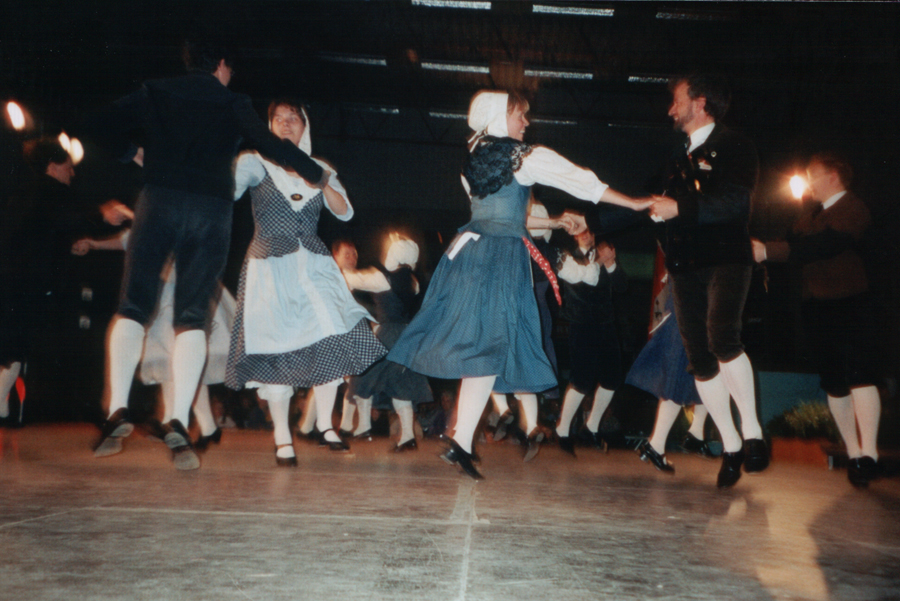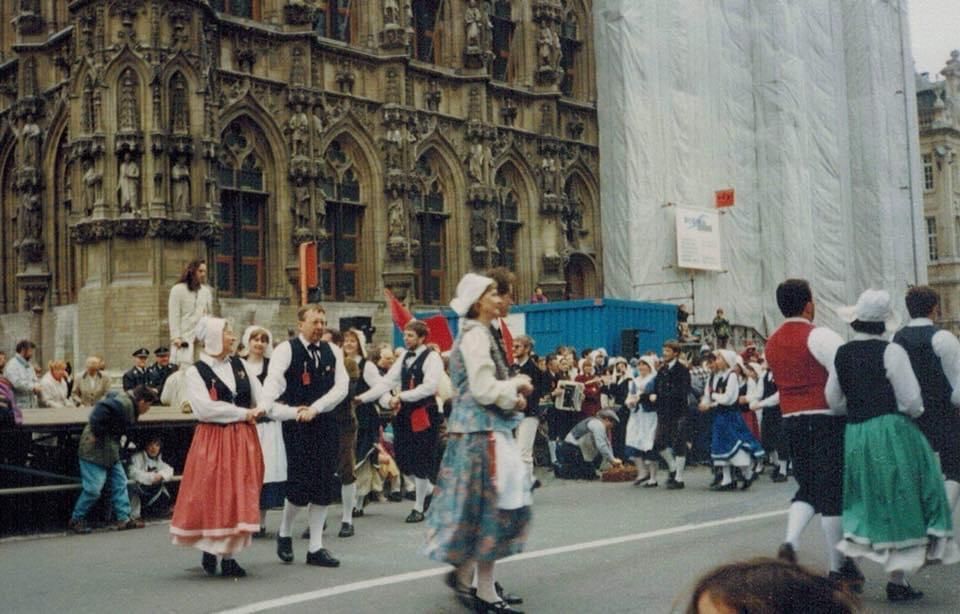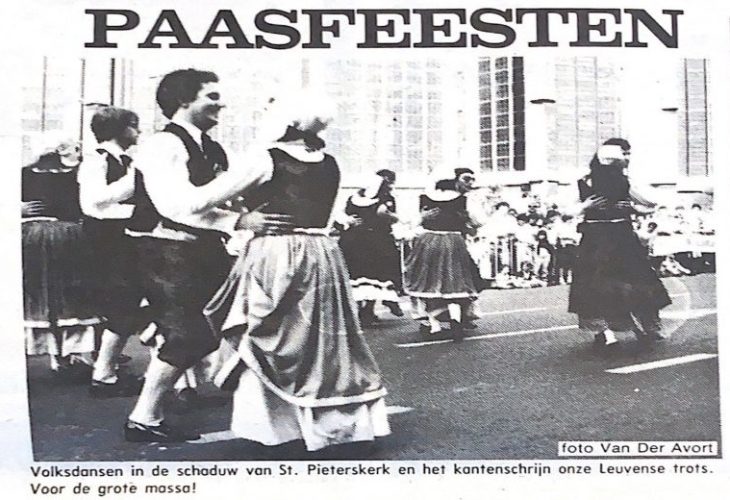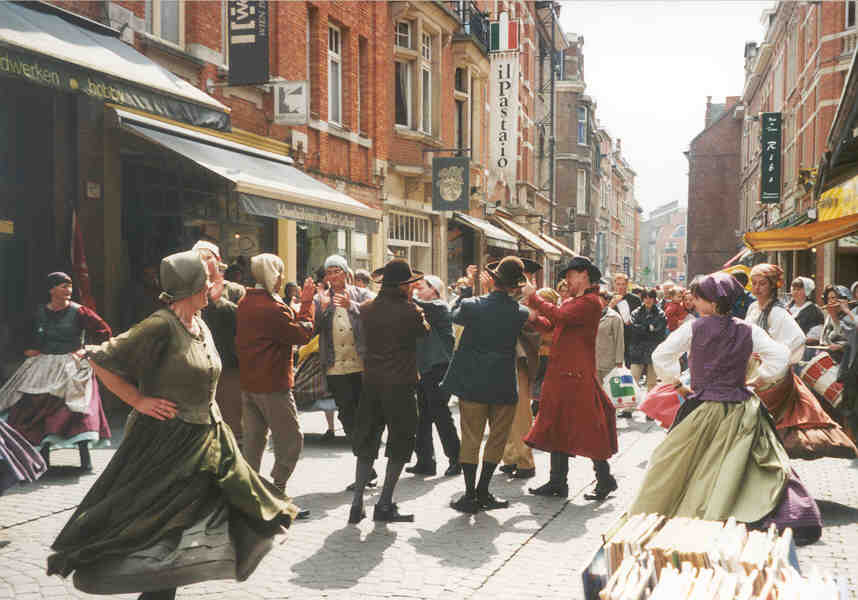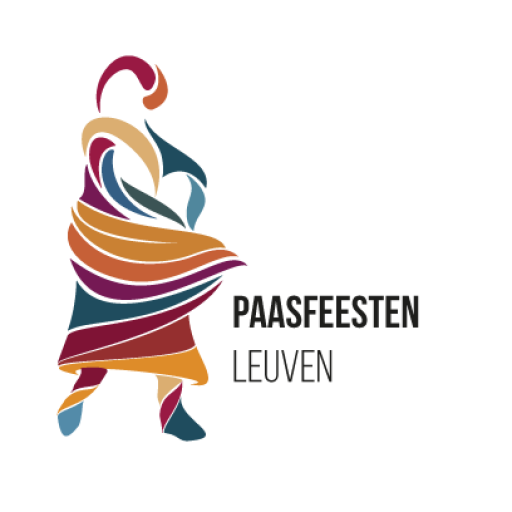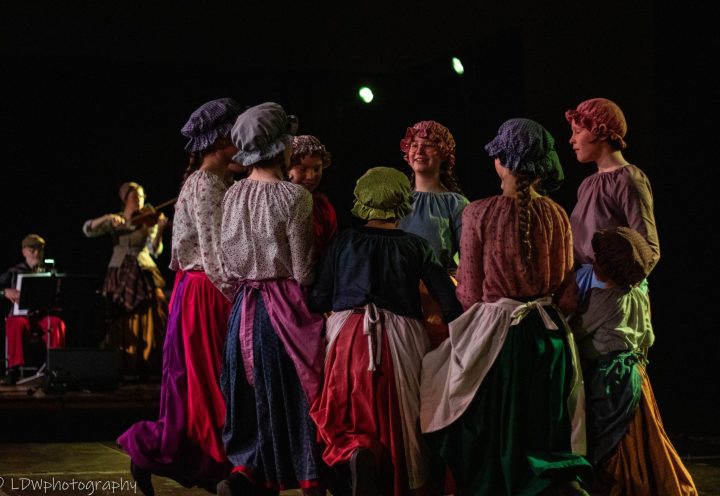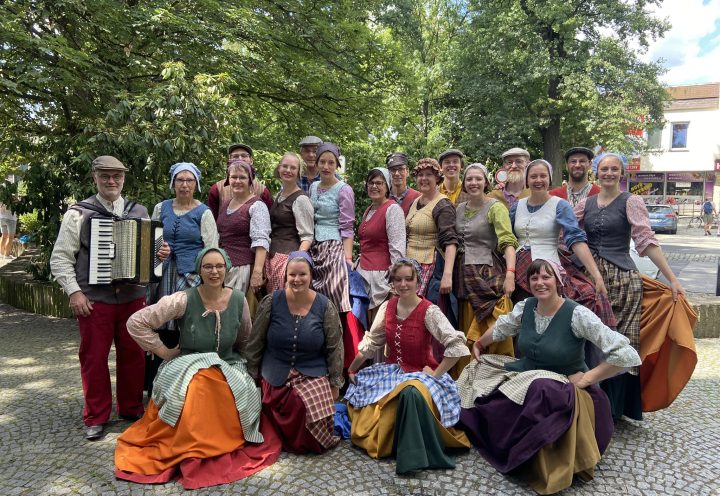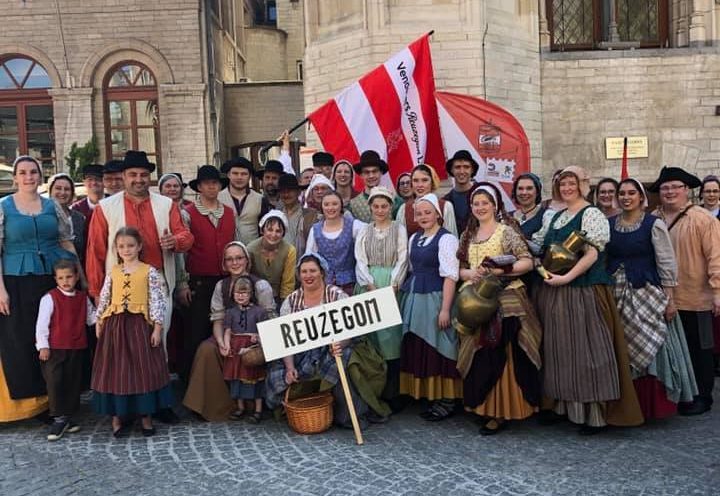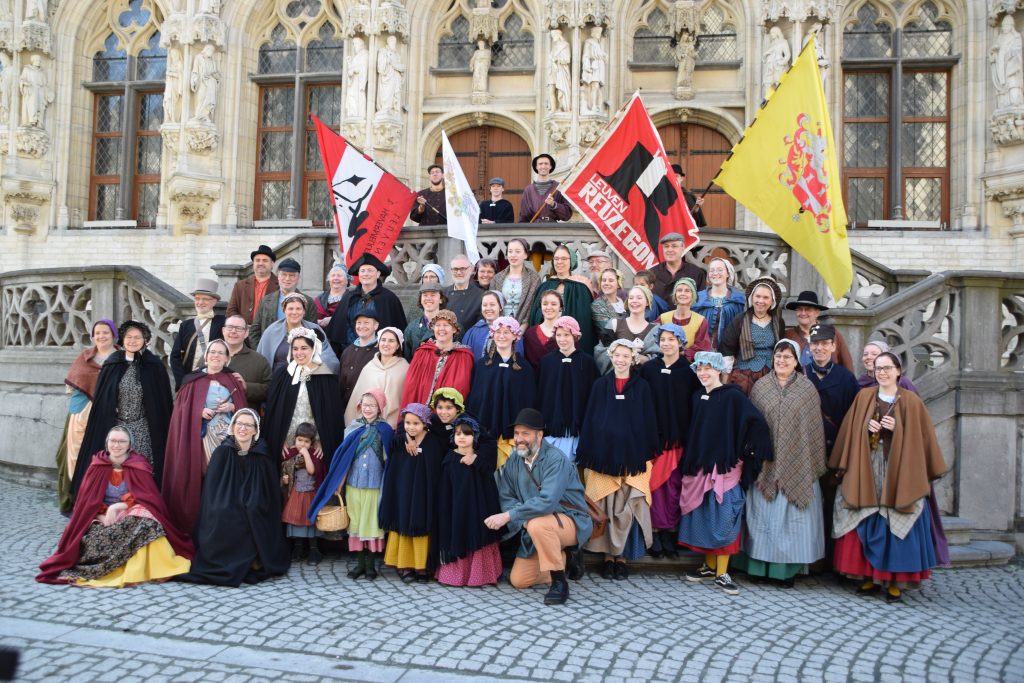
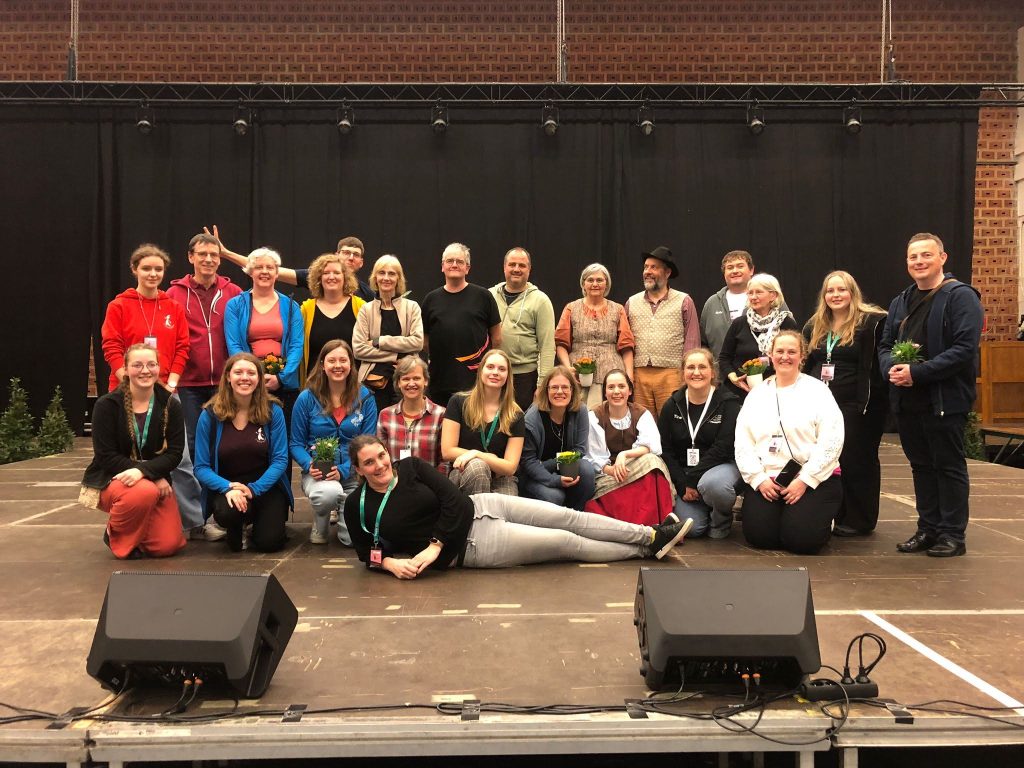
What is Paasfeesten Leuven?
“Paasfeesten Leuven” is a folklore festival that is being organised annually since 1975 in collaboration with the city of Leuven. The festival invites on average four foreign groups every year. These groups show their best performances on the stage in the multi-purpose sports and dancing hall “De Rijschool” in the Rijschoolstraat.
Together with the dancing and flag-waving groups from Leuven, Carpevento, ‘t Havermeuleke, Reuzegom and Rozemarijntje, they put up a good show and contribute to an Easter weekend filled with culture, fun and performances. Starting from Thursday when the foreign groups arrive, until Tuesday morning when the last of them leave, there are five days to get to know each other, to enjoy performances, workshops and more.
The organisation of the festival is for the most part in the hands of the members of the local folk art groups. From the assembly and decoration of the hall to the dismantling at the end, preparing meals or arranging places for the groups to sleep, planning of the programme, promotion and searching for financing, everything is being taken care of by volunteers.
Of course this is only one side of the festival, it is much more than performances, workshops and the organising alone. During the festival it is all about fraternisation, host families, hosts and members of the Leuven groups alike, everyone gets to know each other during this fun-filled weekend. You talk to each other in languages you might not even understand properly, but even if there are some minor communication problems, friends are being made for life during this festival. That is what the Paasfeesten is about: real friendship between people.
Organising groups
Rozemarijntje
Since 1990, folk dance group Rozemarijntje proves that children can also catch the folk dance bug. Rozemarijntje’s children mostly perform Flemish dances, on the national and international stage.
‘t Havermeuleke
‘t Havermeuleke, a fun group of dancers, flag wavers and musicians, created in 1976, got its name from a Flemish folkdance, where fraternisation and enjoyment take centre stage. Anyone who is at least 14 years old is welcome in our group, fun guaranteed for all!
Reuzegom
Folk art group Reuzegom from Leuven got its name from “Reuzenliedje” (“Giants’ song”), which has sounded throughout the city for decades from the carillon in the university library. In a modern fashion, Reuzegom tries to help Flemish folklore traditions live on for the next generations.
A bit of history
In 1975 a group of enthusiasts of folk art came up with the idea of starting an international folklore festival in their hometown of Leuven. For the organisation of this event they could count on the support of Volkscultuur Vlaams-Brabant (council for folk culture in Flemish Brabant), de Leuvense Cultuurraad (the Cultural Board in Leuven), de Leuvense Gidsenbond (the Leuven Guide association), Leuvenement vzw (association for tourism in Leuven) and of course the city council of Leuven, that still considers the Leuvense Paasfeesten as the start of the touristic season.
Thanks to the success of the first edition of the Easter Festival the Leuvense Paasfeesten, the organisers thought it would be a good idea to organise this festival annually, thus a new non-profit organisation was born. This organisation has been, and still is the main organiser of the festival that takes place during the Easter Weekend.
Throughout the years many different formulas have been tried out and changes have been made to make the festival more appealing. One of the biggest changes and a leap to more brand awareness, was made in the year 1982. Since 1982 all activities would be held in a big, heated marquee on the Ladeuzeplein (one of the major squares in Leuven) . The Ladeuzeplein, however, was due to be reconstructed in 1990 because of which the festival could not take place there. In 1991 then, the committee of the festival decided to move to the multi-purpose sports and party hall, “De Rijschool”, which is located in the Rijschoolstraat. Until today most of the activities take place in this hall. Thanks to these changes and the collaboration of the local media, such as ROB-TV (a regional TV channel), Rondom (a regional newspaper) and regional additions to newspapers, the festival’s brand got widely advertised; it became, and still is a well-known folk dance festival throughout Flanders.
When organising the festival, each year, the committee tries to find four foreign groups to take part in the festival. These groups often come from various corners of Europe and occasionally from other continents. Together with the groups from Leuven: ‘t Havermeuleke, Reuzegom and Rozemarijntje, they put up a good show and contribute to an Easter weekend filled with culture, fun and performances. Just about every country and region in Europe has attended the Easter Festival.
Many of the groups that come to the festival likewise have invited one of the groups from Leuven to take part in a festival in their own region. This creates a circuit of mutual exchange and friendship.
Important to know might be that the Leuvense Paasfeesten has been acknowledged as an official Folk Festival by CIOFF (International Council of Organisations of Folklore Festivals and Folk Arts). CIOFF is an international organisation that is associated with UNESCO. Next to promotional purposes, it is more of a moral support for the festival. As organiser of the festival, we take pride in knowing this.
Because of the growth of the organisation, the continued interest of the city council and new impulses from the Handelaarsverbond (association of shop owners) throughout the existence of the festival, a new, properly organised and professional structure needed to be adopted. Such annual events bring more colour, publicity and international renown to Leuven, while involving the local population and companies in the event.
After the fortieth edition of the Leuvense Paasfeesten in 2014 we decided that a change of direction was necessary. Ever since that change, people are working hard to give the festival a more modern look, such as to make it more attractive for younger people as well, to come and have a look and maybe try a dance or two. A new logo, an appealing catchphrase, a festival that captures the public imagination, all those things make the Paasfeesten what it is right now.
